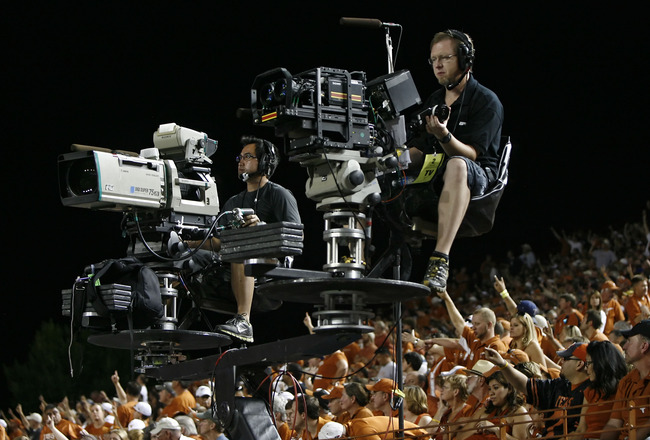ESPN
By, Zach Janes & Doug Topping
ESPN’s Economies of
Scale
ESPN’s greatest advantage is the fact that it has grown to
be so big that it achieves a highly efficient economy of scale. This is one of the essential factors which
led to its monopoly power in the sports broadcasting industry. They broadcast in over 200 countries, being
the only 24 hour network in the United States that is devoted to everything to
do with sports. Their programming and
advertisements can be transferred easily between the different leagues or even
different sports that they are broadcasting, making ESPN significantly more
cost effective than any other companies trying to compete. ESPN easily out buys any competitors to get
whatever broadcast rights it wants. For
example, ESPN owns the rights to Monday Night Football, Sunday Night Baseball,
and Friday Night NBA Basketball. They
also control more than 70% of all college bowl games (Mark, 2010).
Competitive Advantage
It’s hard to understand how one sports broadcasting company
can gain monopoly power over the rest.
It is clear that first they had to become bigger and more cost effective
in order to out buy them on every occasion, but how did ESPN get there? Well just like every other broadcasting company,
they would pay a certain amount of money for the rights to broadcast an event, and
then would have to make enough money in advertising to cover that. The big difference with ESPN is that everyone
who buys cable packages in the United States is also paying for a subscription
to ESPN. Many people don’t know this,
but it is a small amount for them, which adds up to a significant subscriber
revenue for ESPN. In fact, people pay
more to subscribe to ESPN than any other network. For example, in 2008, CBS’s market cap at
$3.97 billion was less than the $4.3 billion that ESPN got from cable
subscription fees (Travis, 2008). When you put that on top of the money they
make from advertisements on some of the most watched events throughout North
America and even the world, ESPN became unstoppable. They became able to pay more for any
broadcasting rights than anyone else, giving them monopoly power.
ESPN’s Power
ESPN has come to the point where no one can compete with
them, so they essentially decide how Americans consume sports media. They control the times of broadcasting, what
sports are shown, and how the viewers will even view the event, because they
have control. They entered the industry
and gained monopoly power by becoming bigger and more efficient then everyone
else. Now there are barriers to entry
for all other companies, as it is impossible to compete for broadcasting rights
with ESPN. Although some consumers in America may want variety, they can seldom
get it. If they are in love with sports
it is most likely they will only be able to watch them via ESPN, especially
bowl games. ESPN sport shows thrive as
well, as they have the most convenient time slots and are on the same channel
that the huge majority of sports are on.
No matter what consumers want, ESPN will continue to out buy its
competitors, keeping the sports media industry on lockdown. Of course, some people love ESPN as well, but
they better get used to it as a monopoly.
ESPN’s Control
ESPN currently controls many things and buys the rights
to them preventing other companies from using them or broadcasting them. ESPN
is currently in control of 29 of the 34 bowl games for college football, Sunday
night baseball, and Friday night basketball. ESPN is constantly growing and
buying the rights to sports events preventing others from broadcasting that
event. By controlling major sports events ESPN only grows bigger making their
reach even larger. ESPN has become so powerful now that they are able to buy
any rights to a sporting event they please. Currently ESPN broadcasts in over
200 countries and is still expanding.



http://cdn.bleacherreport.net/images_root/images/photos/001/364/116/124978522_crop_650x440.jpg?1316538718
Work Cited
Mark, . "3 Companies That Have Virtual Monopolies In
The United States." Buy Like Buffett. N.p., 23 S. Web. 12 Apr 2012.
<http://buylikebuffett.com/finance/3-companies-that-have-virtual-monopolies-in-the-united-states/>.
Travis, Clay. "Exploring the ESPN Business Model (Hint:
It Involves Swimming In Piles of Cash)." Deadspin, Sports News without
Access, Favor, or Discretion. N.p., n.d. Web. 12 Apr. 2012.
<http://deadspin.com/5098814/exploring-the-espn-business-model-hint-it-involves-swimming-in-piles-of-cash>.
Your articles are consistently excellent. You're doing a fantastic job. This will be really beneficial to many others. By the way, I'm a gamer, and I'd like to recommend a shader pack for Minecraft to you. You can get the BSL Shaders set here, and I'm sure you'll enjoy it.
ReplyDelete